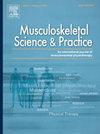Digital health self-management interventions for musicians with playing-related musculoskeletal disorders: A scoping review
IF 2.2
3区 医学
Q1 REHABILITATION
引用次数: 0
Abstract
Introduction
Playing-related musculoskeletal disorders are common in musicians. Self-management interventions are recommended to improve the management of musculoskeletal disorders and support individuals to safely take responsibility for their own health. Digital health interventions are increasingly used to support self-management of musculoskeletal disorders. However, their use in musicians remains poorly understood.
Aim
The aim of this scoping review is to map the available evidence on digital health interventions for the self-management of playing-related musculoskeletal disorders in musicians. This includes summarising the key characteristics of current interventions including content, mode of delivery and theoretical underpinning, their effect on musicians’ ability to continue to play, and exploring any reported adverse effects, to inform future interventions.
Methods
The review followed the Joanna Briggs Institute scoping review framework and was reported according to the Preferred Reporting Items for Systematic reviews and Meta-Analyses extension for Scoping Reviews.
Results
Nine studies were included. None of the interventions were underpinned by a theoretical framework. All interventions targeted student and orchestral musicians, involving exercise, health education, or both, and were delivered via pre-recorded videos (n = 4), websites (n = 3), and video conferencing (n = 2). Six interventions were home-based, one was conducted at a university, and two included a combination of home-based and workplace sessions. Exercise-based digital health interventions (n = 7) reported improvements in pain and physical outcomes.
Conclusion
The evidence on digital health interventions for musicians is limited, with studies targeting student and orchestral musicians and none applying theoretical frameworks. This highlights the need for broader and more rigorous self-management interventions for PRMSDs in musicians.
音乐家与演奏相关的肌肉骨骼疾病的数字健康自我管理干预:范围审查
与演奏相关的肌肉骨骼疾病在音乐家中很常见。建议采取自我管理干预措施,以改善对肌肉骨骼疾病的管理,并支持个人安全地对自己的健康负责。数字健康干预措施越来越多地用于支持肌肉骨骼疾病的自我管理。然而,人们对它们在音乐家身上的作用仍然知之甚少。目的:本综述的目的是绘制音乐家自我管理与演奏相关的肌肉骨骼疾病的数字健康干预措施的现有证据。这包括总结当前干预的关键特征,包括内容、交付模式和理论基础,它们对音乐家继续演奏的能力的影响,并探索任何报告的不利影响,为未来的干预提供信息。方法本综述遵循乔安娜布里格斯研究所的范围综述框架,并按照系统综述的首选报告项目和范围综述的元分析扩展进行报告。结果纳入9项研究。这些干预措施都没有理论框架支撑。所有干预措施都以学生和管弦乐音乐家为目标,包括锻炼、健康教育或两者兼而有之,并通过预先录制的视频(n = 4)、网站(n = 3)和视频会议(n = 2)进行。六项干预以家庭为基础,一项在大学进行,另外两项包括家庭和工作场所的结合。基于运动的数字健康干预(n = 7)报告了疼痛和身体结果的改善。结论音乐家数字健康干预的证据有限,研究对象是学生和管弦乐音乐家,没有一个应用理论框架。这突出表明需要对音乐家的prmsd进行更广泛和更严格的自我管理干预。
本文章由计算机程序翻译,如有差异,请以英文原文为准。
求助全文
约1分钟内获得全文
求助全文
来源期刊

Musculoskeletal Science and Practice
Health Professions-Physical Therapy, Sports Therapy and Rehabilitation
CiteScore
4.10
自引率
8.70%
发文量
152
审稿时长
48 days
期刊介绍:
Musculoskeletal Science & Practice, international journal of musculoskeletal physiotherapy, is a peer-reviewed international journal (previously Manual Therapy), publishing high quality original research, review and Masterclass articles that contribute to improving the clinical understanding of appropriate care processes for musculoskeletal disorders. The journal publishes articles that influence or add to the body of evidence on diagnostic and therapeutic processes, patient centered care, guidelines for musculoskeletal therapeutics and theoretical models that support developments in assessment, diagnosis, clinical reasoning and interventions.
 求助内容:
求助内容: 应助结果提醒方式:
应助结果提醒方式:


